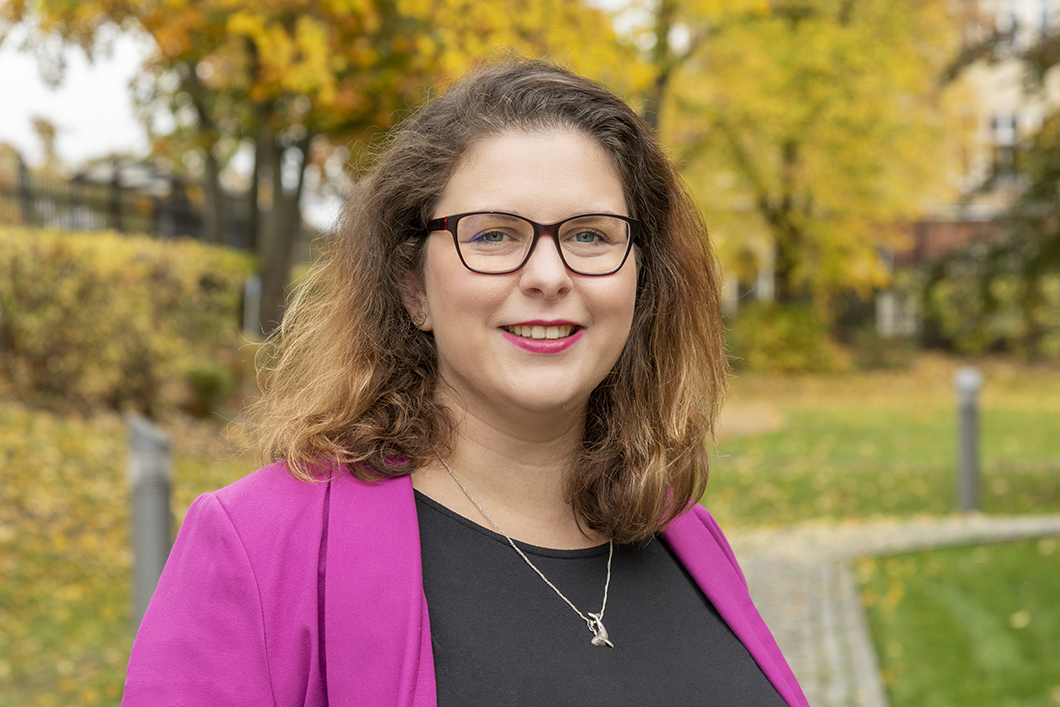
Lydia-Yasmin Sobisch, Fachbereich Biologische Materialschädigung und Referenzorganismen
Quelle: BAM
Interview Serie "Kurz vorgestellt: Menschen@BAM"
Lydia-Yasmin Sobisch, Fachbereich Biologische Materialschädigung und Referenzorganismen
Lydia tell us a little bit about yourself. Why did you choose to pursue a PhD at BAM?
I am fascinated by microbes. Microbes are amazing. But first, I am the first one of my family who studied. I studied Life Science at the University of Potsdam for my bachelors. There I had the chance to work with tiny water organisms as a student assistant and during my bachelor thesis. It was fantastic and I learnt a lot about water ecosystems and trophic system. I also worked with Synechococcus, a Cyanobacterium. Because of that I decided to study microbiology for my master’s. I did an internship in Stockholm where I worked with genes involved in biofilm formation of E. coli. During my master thesis, I worked with bacteria isolated from antimicrobial surfaces attached inside the International Space Station. That was quite fancy. Since then, I was sure to work with bacteria. Ideally, I want to understand the mechanisms underlying antimicrobial resistance and hope to find ways to protect the human health. And at the right time, there was the project of biocide resistance evolution in bacteria causing corrosion at BAM. What else could I do and apply for that? And I was lucky, to have been chosen.
Do you have any role models and, if so, which ones?
If I have a role model? Yes, my grandpa. He never studied but he taught me how and why lifelong learning is necessary. He loved physics and chemistry, and we talked a lot about science in general. He also taught me how to build a computer when I was 10 years old and I used it for school. I always was the biologist in that relationship. So, I tried to ‘teach’ him what I have learned and read. I learnt from that 1) there is always a time to learn, 2) step out of your comfort zone but 3) all of that to your own speed.
What does your research focus on, and what excites you most about this topic?
Mostly, bacteria in man-made systems, such as in the oil and gas industry which are unwanted. So, biocides are used to counteract against the microbial growth. Tons of biocide per year are used to fight against bacteria in pipelines. Here, I start my research. How do bacteria survive against the biocidal treatment? What is the genetic basis of the resistance towards the used biocides? And so far, there is no publication on that topic. I will be the first one and that is quite cool, isn’t it?
Have there been any obstacles or challenges in your career so far? And if so, how did you overcome them?
I faced some troubles during the COVID pandemic. First, I have a – small child in daycare but neither of us – my husband nor me – had system relevant jobs. That means, we somehow needed to manage to work both and take care of our child. We used many of the “childcare days” offered by the health insurance. Because of that, my project was paused. Second, we experienced delivery problems of important consumables like 1 mL syringes and chemicals for media preparation. Third, to work anaerobically we are using a glovebox. During the last year I became an “engineer” as I learnt to maintain and repair it. All problems summarized have thrown me back in the schedule. Here, I am grateful that BAM and my supervisor offer me an extension to finish the PhD next year.
What do you like most about your PhD experience and how is BAM unique to other institutes?
At BAM, the exchange between the working groups of a department or working groups in the same subject area is strongly encouraged. Here one learns beyond one's own work what has been examined and found out in the existing laboratories. If you advertise at BAM, you have the opportunity to take part in workshops and seminars as well as in BAM's young talent program. In addition to the subject-specific training, you receive advanced skills such as presentation skills, writing skills, communication in an intercultural context, etc. And that is an offer alongside that of the university you are enrolled at.
What do you like to do when you’re not doing research?
I spend a lot of time with my family. It is currently very exciting to (re)discover the world in the way of my 4-year-old. Otherwise, I am a volunteer at “btS – Life Science Studierendeninitiative”. I particularly liked the fact that the German-wide association with 23 branches tries to offer life science students the chance to look at the bigger picture. Soft skill workshops, application training, hard skills and scientific talks are organized by students for students.
If you should describe your job at BAM in one word – what would that be?
diverse


